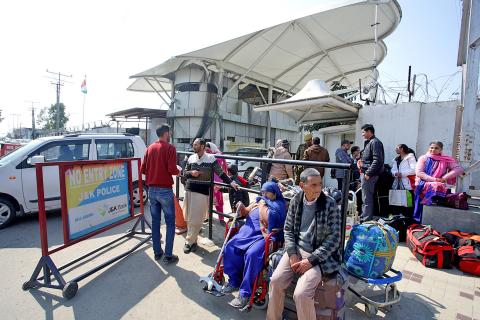Pakistan and India yesterday said that they had shot down each other’s warplanes in an escalating confrontation that has fueled concerns of a catastrophic conflict between the nuclear-armed rivals.
Pakistani Prime Minister Imran Khan called for talks between the neighbors, saying that “better sense should prevail.”
While both sides have sought to play down the threat of war, the rare air force engagement over the divided and disputed territory of Kashmir significantly raises the stakes in a standoff sparked by a suicide attack in the side controlled by India earlier this month.

Photo: EPA-EFE
Pakistan said it downed two Indian jets in its airspace and captured two pilots, while India confirmed the loss of one of its planes and said it had shot down a Pakistani fighter.
In a sign of the deepening crisis, Pakistan closed its airspace “until further notice.”
At least six airports were closed in India, and a vast area north of New Delhi was closed to civilian flights.
Pakistani military spokesman Major General Asif Ghafoor told a news conference that one of the downed Indian planes had fallen in Pakistani-held Kashmir, while the other came down on the Indian side of the heavily militarized Line of Control, the de facto border dividing the Himalayan territory.
“We do not want escalation, we do not want to go toward war,” Ghafoor said, adding that one of the captured pilots was in custody and the other was in the hospital.
The jets had been shot down after Pakistani warplanes earlier flew across the Line of Control to the Indian side in a show of strength, hitting non-military targets, including supply depots, he said.
Afterward, the two Indian warplanes crossed the Line of Control into Pakistani airspace, he added.
He denied initial reports that a Pakistani warplane had been shot down, calling accounts an F-16 had been lost incorrect, as none were used in the action.
Indian Ministry of External Affairs spokesman Rajeesh Kumar later announced that a Pakistani jet was hit as it took part in an operation “to target military installations on the Indian side.”
“In this engagement, we have unfortunately lost one MiG-21. The pilot is missing in action. Pakistan has claimed that he is in their custody,” he added.
The US and other members of the international community have acted to defuse tensions between the two previously.
“If I were Washington, I’d be in overdrive making telephone calls and signaling that it wants tensions to be de-escalated now,” said Moeed Yusuf, an expert at the US Institute of Peace in Washington. “The risks of letting this play out are too great.”

A Ministry of Foreign Affairs official yesterday said that a delegation that visited China for an APEC meeting did not receive any kind of treatment that downgraded Taiwan’s sovereignty. Department of International Organizations Director-General Jonathan Sun (孫儉元) said that he and a group of ministry officials visited Shenzhen, China, to attend the APEC Informal Senior Officials’ Meeting last month. The trip went “smoothly and safely” for all Taiwanese delegates, as the Chinese side arranged the trip in accordance with long-standing practices, Sun said at the ministry’s weekly briefing. The Taiwanese group did not encounter any political suppression, he said. Sun made the remarks when

The Taiwanese passport ranked 33rd in a global listing of passports by convenience this month, rising three places from last month’s ranking, but matching its position in January last year. The Henley Passport Index, an international ranking of passports by the number of designations its holder can travel to without a visa, showed that the Taiwan passport enables holders to travel to 139 countries and territories without a visa. Singapore’s passport was ranked the most powerful with visa-free access to 192 destinations out of 227, according to the index published on Tuesday by UK-based migration investment consultancy firm Henley and Partners. Japan’s and

BROAD AGREEMENT: The two are nearing a trade deal to reduce Taiwan’s tariff to 15% and a commitment for TSMC to build five more fabs, a ‘New York Times’ report said Taiwan and the US have reached a broad consensus on a trade deal, the Executive Yuan’s Office of Trade Negotiations said yesterday, after a report said that Washington is set to reduce Taiwan’s tariff rate to 15 percent. The New York Times on Monday reported that the two nations are nearing a trade deal to reduce Taiwan’s tariff rate to 15 percent and commit Taiwan Semiconductor Manufacturing Co (TSMC, 台積電) to building at least five more facilities in the US. “The agreement, which has been under negotiation for months, is being legally scrubbed and could be announced this month,” the paper said,

MIXED SOURCING: While Taiwan is expanding domestic production, it also sources munitions overseas, as some, like M855 rounds, are cheaper than locally made ones Taiwan and the US plan to jointly produce 155mm artillery shells, as the munition is in high demand due to the Ukraine-Russia war and should be useful in Taiwan’s self-defense, Armaments Bureau Director-General Lieutenant General Lin Wen-hsiang (林文祥) told lawmakers in Taipei yesterday. Lin was responding to questions about Taiwan’s partnership with allies in producing munitions at a meeting of the legislature’s Foreign Affairs and National Defense Committee. Given the intense demand for 155mm artillery shells in Ukraine’s defense against the Russian invasion, and in light of Taiwan’s own defensive needs, Taipei and Washington plan to jointly produce 155mm shells, said Lin,